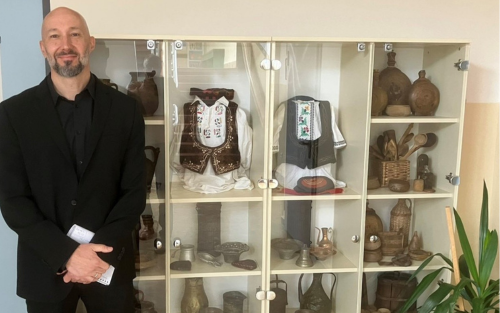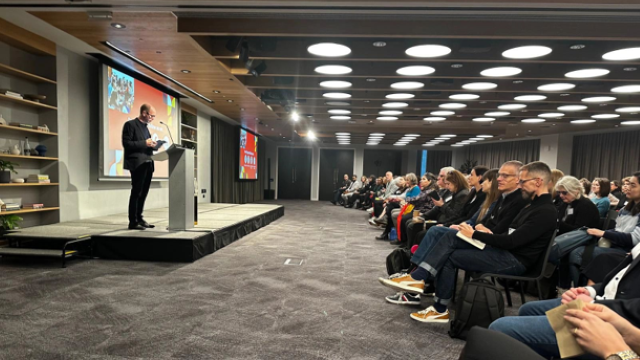-
QUALIFICATIONS
- For Linguists Worldwide
- For UK Public Services
- Preparation
- Policies & Regulation
-
MEMBERSHIP
- Join CIOL
- Membership grades
- NEW for Language Lovers
- Chartered Linguist
- Already a member?
- Professional conduct
- Business & Corporate Partners
-
ASSESSMENTS
- For Second Language Speakers
- English as a Second Language
-
EVENTS & TRAINING
- CPD, Webinars & Training
- CIOL Conference Season 2025
- Events & Networks
- CIOL Mentoring
-
NEWS & VOICES
- News & Voices
- CIOL eNews
- CIOL Awards
- The Linguist
- Jobs & Ads
-
RESOURCES
- For Translators & Interpreters
- For Universities & Students
- Standards & Norms
- CIOL & AI
- All Party Parliamentary Group
- In the UK
- UK Public Services
- Find-a-Linguist
Implementing gender-sensitive language in Serbia, Part II
What do the professionals say?

by Andreja Milošević MCIL, translator and interpreter, seen here with display cabinet showing traditional Serbian artefacts produced by vulnerable groups
The foregoing text follows up a brief retrospect on implementation of gender sensitivity in the Serbian language which was posted on CIOL Voices in November 2024. It is intended as the second of three texts in a series discussing the development of gender sensitive language in Serbia – the first text was focused on the legislative and political aspect, the second part provides opinions of language professionals regarding the approach taken, and the third will target language specifics that impact on the implementation.
The first text which was published last November dealt principally with the political events surrounding the efforts to adopt gender equality legislation (including gender sensitive language) in Serbia, the opposition by the conservatives in the political and clerical circles and the eventual revocation of the law by the Constitutional Court only one month after it was adopted in legislation. The feedback I received from several language professionals who read the article indicated that it could be interpreted as implying that language professionals (and female language professionals in particular) were in support of the top-down approach and the inclusion of language-related instructions in the legislation, where the opposite was true.
In order to correct the implication and balance the perceptions surrounding the issue, I conducted interviews with three linguists – Ana Jovanovic PhD, Professor of Spanish Language and Applied Linguistics, Jelena Stojic, Professor of English Language and Literature, and Milena Stjepanovic, Professor of Italian Language and Literature.
The responses were largely concurrent and were therefore summarised against each of the three questions asked, as below:
Do you think that the top-down approach where a specific language instruction was prescribed by the law incited the conservative / patriarchal segments of the society to abreact?
Adequate implementation of policy requires sound knowledge of the subject matter, as well as that of the wider issues at stake – in this case, the social and political connotations. Recent efforts to implement gender-sensitive language in gender equality legislation were lacking these elements because the process did not involve professionals from related fields (including languages, sociology, administration, etc.).
Accordingly, if the intention was to improve the position of women and marginalised / vulnerable groups, preparations for the project should have incorporated thorough assessment of risks, one of which is adverse reactions by the conservatives and the consequences of such reactions. Because this was not done, a counter-productive process was created. However, it did bring one indirect benefit, in that the problems have been laid bare and the rightists in religious and secular institutions alike have identified themselves.
Would you say that the unbalanced approach served as justification to oppose and bring down the law?
It is open to speculation whether this was a “Trojan horse” approach – something intentionally aimed at provoking a strong reaction which would in turn bring down the entire law (not just its language-related part) and prevent changes enabling gender equality. But more broadly, it is important to understand that the problem with the top-down approach is not limited to the perceptions of the conservatives – a number of female professionals would have an issue with being legally bound to use a particular language form in communicating about their profession.
There are two principal reasons, the first being opposed to not having a choice as to the preferred form, the second being the perception of “reversed discrimination”. Some female professionals feel that their efforts to achieve the same education, qualifications and positions as their male counterparts are diminished by the differentiation in educational and professional titles, particularly where there is a negative perception regarding the linguistic dualism among their male colleagues.
The process should have started with forming a taskforce composed of language and ethics professionals who would undertake proper research. Based on the results, the taskforce would issue recommendations to the relevant stakeholders who would take a balanced political approach. This would then be followed by an agreed testing period during which monitoring and data collection would be undertaken to enable review and defining of further steps.
Would you say that what happened shifted the focus from the truly important issue of empowerment of women to a relatively peripheral language manifestation?
The emphasis placed on professional feminitives trivialised the broader issue of gender equality. The core issue is the implementation of gender equality legislation as a whole, not just its language aspect. By the same logic, it could be argued that the effort to introduce mandatory implementation of gender sensitive language as a legal requirement has done more harm than good and should probably be removed, with future efforts directed towards issuing recommendations. Moreover, if treated as an isolated legal measure largely limited to professional feminitives, the focus of language changes is diverted from more fundamental issues, such as that the Serbian Constitution only recognises the binary concept of the two sexes and not the gender. The issue of professional feminitives would require a soft touch with enough time provided to let them assimilate into the language at a natural pace, like other neologisms.
Conclusion
In conclusion, while gender sensitive language is seen as a necessary component of reaching gender equality in Serbia, some language professionals feel that the top-down approach could be detrimental to the cause. There is a general agreement that the process needs to be consultative rather than enforced, and inclusive of a wide net of professional stakeholders.
Andreja Milošević MCIL is a Serbian translator and interpreter, and is a member of CIOL's ED&I Committee.
Views expressed on CIOL Voices are those of the writer and may not represent those of the wider membership or CIOL.
Filter by category
More
The Chartered Institute of Linguists (CIOL), Incorporated by Royal Charter, Registered in England and Wales Number RC 000808 and the IoL Educational Trust (IoLET), trading as CIOL Qualifications, Company limited by Guarantee, Registered in England and Wales Number 04297497 and Registered Charity Number 1090263. CIOL is a not-for-profit organisation.








